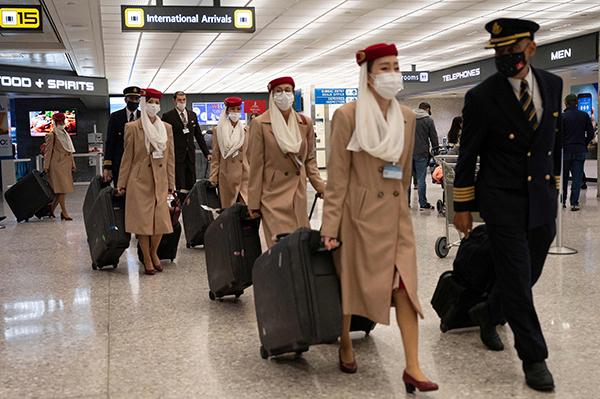
The only good news about the latest COVID-19 variant to emerge—and there really is no good news—is that it doesn’t share a name with a major airline.
Omicron, as this virus variant has been labeled, may have a scientifically different makeup from the delta and other mutations, but the human story of how governments are reacting is much the same: panic and loudly declare the shutting of borders and cutting of air travel links. It is as if nothing has been learned over the past dismal 23 months of pandemic endurance.
Countries all over the world have rushed to ban air travel from southern Africa countries where omicron is believed to have originated, or to suspend the lifting of travel restrictions that had finally begun after lengthy lockdowns.
Government tendency to focus on air travel in controlling the spread of COVID is not based on data or science. It is merely an easy and visible mechanism for looking as if the government is “doing something.”
The best defense against this virus is a much harder political sell. Vaccination rates in the US and Europe stalled earlier this year after those people who wanted to be vaccinated were inoculated. Governments were not able to convince most of the rest of their citizens of the wisdom of vaccination, even when the delta variant rolled in and claimed far more lives among the unvaccinated than those who had been protected.
Attempts in Europe to reintroduce mandatory mask-wearing, social distancing and night curfews have been met with street riots. And governments are wary of supporting significant rollouts of vaccination campaigns in poorer countries that have the least access to vaccines for fear of a backlash on public spending priorities in a crisis.
The swift clampdown on air travel to and from southern Africa countries not only leaves people cruelly stranded and confused, but it also sends a message to other nations that they should not share their scientific data about the virus with other countries.
Proof of vaccination and/or verified testing is the most effective way to minimize transmission risk during air travel while also keeping economies rolling and letting people live their lives. The vaccines and tests that became available in a miraculously short time after the pandemic hit full force are scientifically proven to be highly effective. They are the global answer to defeating what is a global health crisis, not an air transport crisis.
Instead, governments continue to turn to regional, whack-a-mole solutions that needlessly target the air traveler.




Comments
We shouldn’t, however, be naive; this virus is here top stay and will mutate as fast as it can and we will not get rid of it before the end of this decade. Hence, the importance of vaccination, face masks, distancing, washing our hands, etc. Yes, it is not funny and I indeed preferred the BC times (Before Covid), but more than 5.5 millions dead and counting and the huge bill we have to pay for the impacts of this pandemic is even less funny.
B. Guillaume